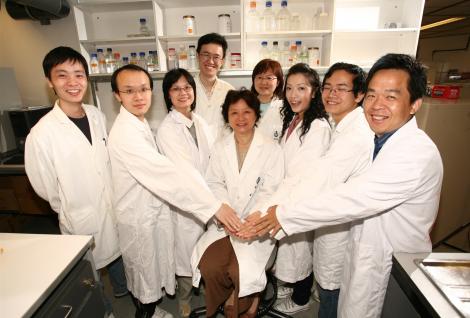Researchers at the Hong Kong University of Science and Technology (HKUST) have made another major discovery that paves the way for finding an effective treatment and prevention of schizophrenia, which affects about one in 100 of the general population.
This is the first time in the scientific world that positive selection has been observed for any schizophrenia related gene. In population genetics, positive selection occurs when natural selection favors a form of gene and therefore frequency of the selected form of gene continuously increases.
The research group, led by Dr Hannah Hong Xue, Associate Professor of Biochemistry and the Director of Applied Genomics Center, won international acclaim for identifying the gene associated with schizophrenia three years ago. The group has now achieved yet another breakthrough in discovering that variations in the schizophrenia related gene is under positive selection, and that people with relatively less mutated form of the related gene may be more susceptible to schizophrenia.
Positive selection has been observed for the genes associated with complex diseases including diabetes and high blood pressure. This latest discovery by Dr Xue also represents the first-ever discovery that positive selection is associated with genes related to mental disorders.
Their findings had been accepted for publication in the latest edition of the influential science journal PloS ONE.
The research group has demonstrated that the schizophrenia-associated DNA polymorphisms in the GABAA receptor beta2 subunit gene are under positive selection. The derived form of gene is better adapted to the modern environment and is thus positively selected over the ancestral form, leading to accumulation of the derived form in modern populations. The selection in schizophrenic patients is weakened relative to normal individuals.
“The findings greatly enhance our understanding of the etiology of schizophrenia. They will open up a new approach of developing cure and preventive measures of the disease and would also establish the usefulness of positive selection as a guide to search for other disease susceptibility genes,” said Dr Xue, a specialist in GABAA receptor research and the genetics of schizophrenia.
In 2003, the team identified a gene associated with schizophrenia. Before that, merely a handful of genes associated with the disease had been discovered. This was also the first time that a schizophrenia-related gene had been initially pinpointed in ethnic Chinese, and validated in other populations.
Schizophrenia affects almost 1% of world population and has a broadly equal prevalence across ethnic groups. The disease manifests itself in a range of ways, including delusions, hallucinations, etc.
Dr Xue obtained her MD from Shanghai and PhD from the University of Toronto. After two years of post-doctoral work in Glasgow, she joined HKUST in 1995. She is one of the HKUST scientists taking part in the international project to construct the haplotype map (HapMap), which represents the next generation of the human genome blueprint.
For media enquiries, please feel free to contact :
Luk Kam Wing
Tel: 2358 6306
Email: kluk@ust.hk
Winnie Ly
Tel: 2358 8556
Email: winniely@ust.hk


